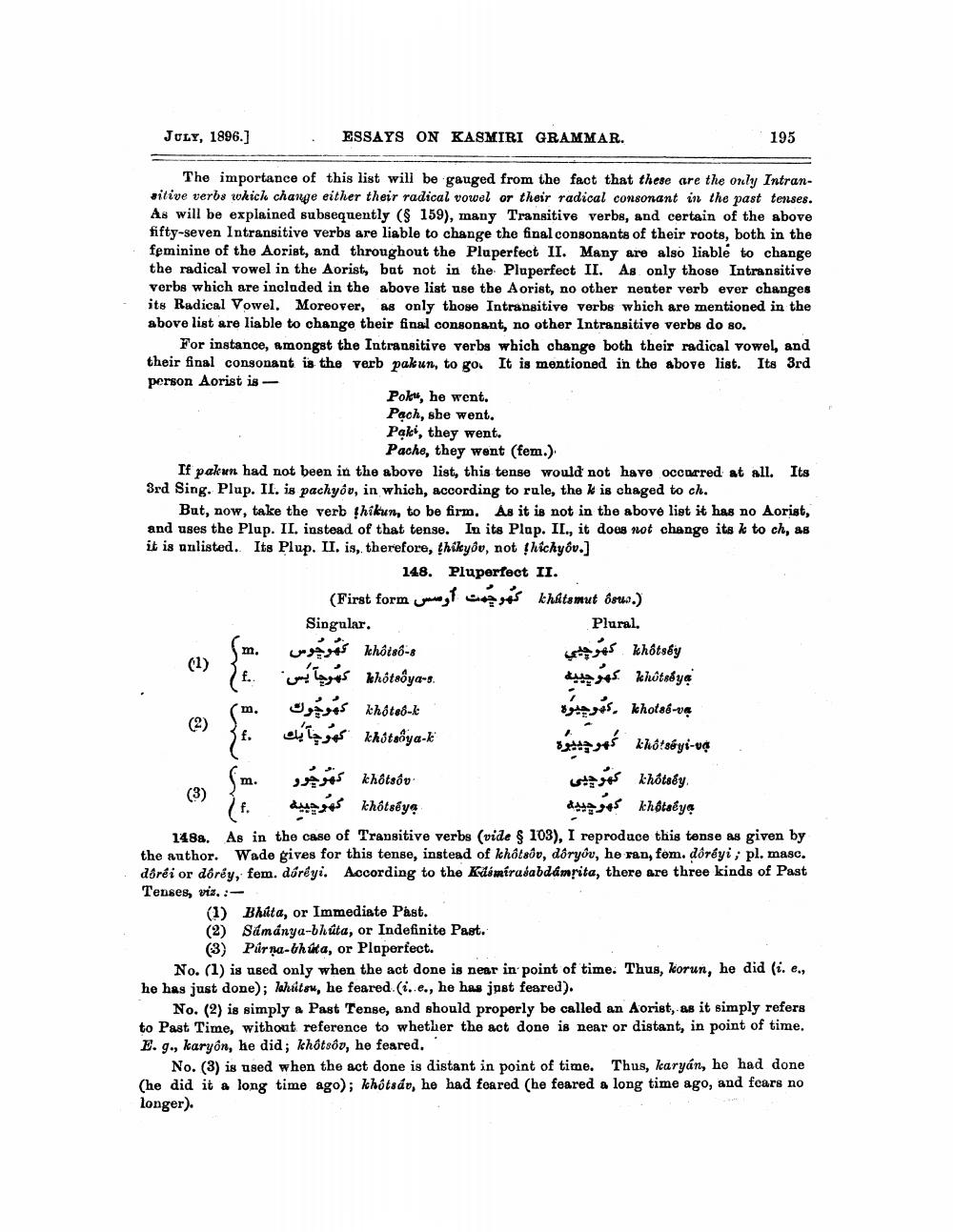________________
JULY, 1896.]
ESSAYS ON KASMIRI GRAMMAR.
195
The importance of this list will be gauged from the fact that these are the only Intransitive verbs which change either their radical vowel or their radical consonant in the past tenses. As will be explained subsequently (8 159), many Transitive verbs, and certain of the above fifty-seven Intransitive verbs are liable to change the final consonants of their roots, both in the feminine of the Aorist, and throughout the pluperfect II. Many are also liable to change the radical vowel in the Aorist, but not in the Pluperfect II. As only those Intransitive verbs which are included in the above list use the Aorist, no other neuter verb ever changes its Radical Vowel. Moreover, as only those Intransitive verbs which are mentioned in the above list are liable to change their final consonant, no other Intransitive verbs do so.
For instance, amongst the Intransitive verbs which change both their radical vowel, and their final consonant is the verb pakun, to go. It is mentioned in the above list. Its 3rd person Aorist is -
Poku, he went. Pach, sbe went. Paki, they went.
Pache, they went (fem.) If pakan had not been in the above list, this tense would not have occurred at all. Its 3rd sing. Plup. II. is pachyov, in which, according to rule, the k is chaged to ch.
But, now, take the verb thikun, to be firm. As it is not in the above list it has no Aorist, and uses the Plup. II. instead of that tense. In its Plap. II., it does not change its k to ch, as it is unlisted. Its Plup. II. is, therefore, thikyou, not thíchyov.]
148. Pluperfect II.
(.khata mut Gen کھو چوت آرسس First form)
Singular. ra khôtsổ-4 con el logós khôts@ya-s. Wyngas khôte8-k
To jer khótsöya-k
Plural. Wys khôtsey de ses khôtedya vous gars, khotos-vę
magas Lhotséyi-vo
(m. je.
jes khôtsov
.khatasy کوچیی khataeys کهوچييه
کھوچبية
khatsage
148a. As in the case of Transitive verbs (vide $ 103), I reproduce this tense as given by the author. Wade gives for this tense, instead of khôtsôv, dôryov, he ran, fom. dôréyi; pl. masc. døréi or doréy, fem. dórêyi. According to the Kdómíraéabdámsita, there are three kinds of Past Tenses, via. :
(1) Bhatta, or Immediate Påst. (2) Sámánya-bhúta, or Indefinite Past.
(3) Pärna-bh úda, or Plaperfect. No. (1) is used only when the act done is near in point of time. Thus, korun, he did (i. e., he has just done); lahatsu, he feared.(i..e., he has just feared).
No. (2) is simply a Past Tense, and should properly be called an Aorist, as it simply refers to Past Time, without reference to whether the act done is near or distant, in point of time. E. g., karyôn, he did; khôtsôv, he feared.
No.(3) is used when the act done is distant in point of time. Thus, karyán, ho had done (he did it a long time ago); khótsdv, he had feared (he feared a long time ago, and fears no longer).




